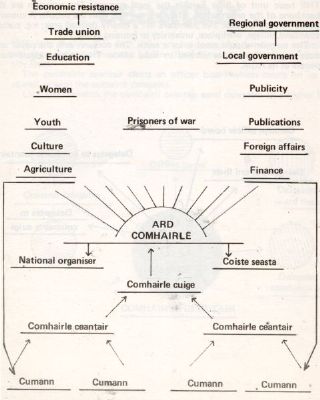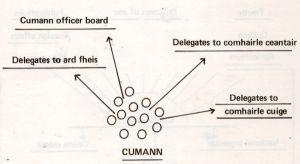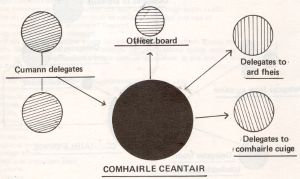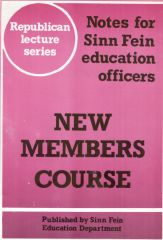
'New Members Course: Notes for Sinn Féin education officers, Republican Lecture Series', Sinn Féin (1979?)[Key_Events] [Key_Issues] [Conflict_Background] POLITICS: [Menu] [Reading] [Articles] [Government] [Political_Initiatives] [Political_Solutions] [Parties] [Elections] [Polls] [Sources] [Peace_Process]
Notes for
Republican
Published by Sinn Féin
Security THIS lecture need not be done from any particular text and should be delivered in an easy, but not casual, manner. The following numbered points must be made and in the stated order. 1. You are now at the start of your road to membership of Sinn Féin. 2. Sinn Féin is the political section of the Republican Movement so you should not misunderstand what you are joining. 3. Sinn Féin is an open political organisation which presents itself to the public. 4. Sinn Féin is not a secret or illegal organisation. Its activities are legal and are carried out in full view of the public. 5. Even though Sinn Féin is not illegal you can expect to suffer some harassment from the gardai, probably the Special Branch, in the South; and British soldiers or the RUC in the North. 6. These people have two main reasons for stopping you and asking you questions. 7. Firstly, they will try to find out about your friends and the people you have met at this and other meetings. We will deal with the type of questions, and what you should say, later. 8. By getting your name and address they will try to work out ways to harass you. By calling to your home, work or school to frighten your family or put pressure on you to leave Sinn Féin. 9. Remember that when you are stopped in the street you are only required to answer the following questions:- AT THIS STAGE A SUITABLE HANDOUT ENCOMPASSING THE REQUIRED POINTS RELATING TO RIGHTS IN EITHER THE NORTH OR THE SOUTH WILL BE DISTRIBUTED TO ALL PRESENT. 10. You need only answer the questions listed but remember that there is no point in trying to be smart or cheeky. The best thing to do is maintain a dignified silence except when you are answering the questions you are legally obliged to answer. 11. At this point you may be arrested. 12. Even though Sinn Féin is legal and open it is important that our activities and the business discussed at our meetings are not divulged to the public or to the enemy state forces and that they remain confidential as is the norm in all political organisations. Of course, if we have a public meeting or demonstration as many ordinary people as possible should be informed. 13. If activity we have planned such as a private meeting, a collection, paper sales, postering or slogan painting is made known to the security forces our people may be prevented from carrying out the planned work, they may be harassed coming to or from the work and, worse still, in the North you might not only be arrested, which is possible also in the South, but may suffer death or injury at the hands of the state forces or loyalists. 14. Sinn Féin work and internal matters should not be the subject of pub gossip or boasting. The political work you will be doing is as important to the Movement as the work of the republican Volunteers. 15. Unless people are helping in our work it is not necessary for them to know about it. 16. At the same time you should not engage in cloak and dagger silliness when out selling papers. 17. You have the hard won and defended right to act publicly as a member of a nationally recognised political organisation. Don’t compromise that right by behaving in an unnecessarily clandestine manner or by foolishly attracting unnecessary attention from the state forces. 18. Remember these points: a. Sinn Féin is an open political organisation but:- b. Don’t talk freely about your work as it only attracts unhelpful attention from the state forces. c. Remember that you are not obliged to give any information on Sinn Féin activity to the state forces. d. At all times remember you have a responsibility to your fellow members and our supporters and should not let them down by giving their names to anybody who is not in Sinn Féin. e. Never make your Sinn Féin work the subject of gossip in the pub or at your workplace.
Introduction to THESE points should be given in conjunction with visual aids. The points listed below are the basic ones and the lecture should expand on them. 1. Sinn Féin is a 32-county political organisation which was established in 1905. Ii is the oldest nationalist political organisation in Ireland. It is the only relevant national (32countv) party. 2. Sinn Féin seeks to establish a 32-county democratic socialist republic which draws its inspiration from the 1916 Proclamation and the Democratic Programme of the First Dail. 3. Sinn Féin is the political wing of the Republican Movement. Sinn Féin is responsible for the public and political party-type work of the Republican Movement. 4. Sinn Féin is a legal and open political organisation. 5. Sinn Féin work consists of:- a. Holding regular meetings. b. Selling 'An Phoblacht/Republican News’. c. Doing the publicity work of the Movement, i.e. leafletting, postering, organising public meetings and protests. d. Acting as the Movement’s political link with the people. e. Implementing the Movement’s social and economic policy. f. Organising electoral work. 6. Sinn Féin requires a real commitment from its members and they are expected to devote a reasonable amount of their time to Sinn Féin work which is never glamorous and often very boring but it is essential nonetheless. 7. Sinn Féin is a democratic organisation with an elected leadership at national and local level. All members of Sinn Féin have the right to attain any position of authority in the organisation. (We will deal with this in detail at the next lecture). 8. Sinn Féin is a national organisation dedicated to the re-unification of our country and the liberation of our people from the grip of native and foreign exploiters. 9. Sinn Féin supports in principle the legitimate struggle being waged by the IRA. 10. Sinn Féin is a socialist organisation. This means that we are opposed to capitalist exploitation of our people, foreign domination of our economic life and natural resources, the oppression of women and the destruction of our youth in a sick and uncaring society. Anyone who is not prepared to accept or be educated in socialist policies is not a suitable applicant for Sinn Féin. 11. Like the rest of the Movement, Sinn Féin is about freeing our people from all oppression whether military, cultural, economic or political. We are committed to changing Ireland not to re-adjusting the present system. 12. Sinn Féin is about fair play and a better future for all our people. As a member of the organisation you can help to do just that. Next week we will discuss the structures of Sinn Féin and your place in the organisation.
Structure

The basic unit of Sinn Féin is the local cumann. The cumainn are the backbone of the organisation. They are our link with the people. A cumann needs to have at least five members in a clearly defined area; e.g. parish, townland, village, workplace, university or housing estate. The cumann should meet once a week. The cumann sells the paper and does any local work as advised by head office. The cumann elects these people at it’s A.G.M.

ceantair The next level is the comhairle ceantair, or district committee, which co-ordinates the work of Sinn Féin at county, regional, large town or city level. The comhairle ceantair elects an officer board which meets on its own as well as with cumainn delegates. Like the cumainn the comhairli ceantair send delegates to a higher level.

cuige The third level in Sinn Féin is the comhairle cuige. This is the provincial delegate body in Sinn Féin. The comhairle cuige co-ordinates work at a provincial level, elects its own officer board and sends two delegates to an ard comhairle.

THE ard comhairle is the governing body of Sinn Féin for the period between ard fheiseanna. The ard comhairle is elected at the annual ard fheis by delegates from cumainn, comhairli ceantair and comhairli cuigi. Outgoing members of an ard comhairle also have a vote at an ard fheis. The ard comhairle is comprised of voting members and two non-voting honorary members as follows:- 1. Uachtaran (president). 2. Beirt leas uachtarain (two vice-presidents). 3. Beirt ard runaithe (two general secretaries). 4. Beirt ard cisteoirr (two general treasurers). 5. Oifigeadh poblaoichta (publicity officer). 6. Eight members elected at ard fheis. 7. Two members elected by each of the four comhairli cuigi (eight in all). 8. Five co-opted (one of whom must be national organiser and one of whom must be national director of finance). 9. two voting honorary members. Sinn Féin also has a coiste seasta (standing committee) which directs the affairs of Sinn Féin between ard comhairle meetings. The eight-strong coiste seasta is normally composed of those members of the ard comhairle resident in the area in which head office is based, i.e. Dublin. Sinn Féin has a large number of departments at national level. 1. Economic resistance. 2. Agriculture. 3. Women. 4. Youth. 5. Publicity. 6. Publications. 7. Education. 8. Regional government. 9. Foreign affairs. 10. National organisers dept. 11. Culture. 12. Finance. 13. POW. Ten of these departments are headed by, and composed of, full-time personnel. Sinn Féin also has twenty-eight councillors in the South who occupy thirty seats. We have also our abstentionist public representative, Owen Carron MP. Apart from head office in Dublin, Sinn Féin has offices in Belfast, Derry, Dundalk, Dungannon, Enniskillen, Monaghan and Tralee. These offices provide a link with the people and are permanently staffed by full-time personnel. As a member of Sinn Féin you are joining the most active political organisation in Ireland. You are part of a large and expanding party with extensive structures and diverse talent. You can play as full a part as your time and talents allow.
Constitution THE constitution and rules of Sinn Féin are the cornerstone of the organisation. The constitution appears on pages 1 to 6 of the booklet you have been handed tonight We will explain the constitution to you in its sections. What this section means basically is that on January 21st 1919, the first-ever elected parliament of all the Irish people met and pledged its allegiance to the 1916 Proclamation, which had been suppressed by force, and that all Irish people owe their allegiance to the republic declared in 1916 and given its democratic mandate by the First Dail. Sinn Féin strives to establish the above mentioned republic on socialist lines based on the democratic proclamation of the First Dail. We seek to restore our language and culture to its proper prominence, under the day-to-day direction of our elected ard comhairle. (including associate membership) This section means that membership is open to all Irish people who support the aims of Sinn Féin and who will abide by the rules. (Membership is open to non-Irish people who uphold the constitution and rules but we are concerned here with our own situation.) Membership takes place through a cumann. New members must serve a six-week non-voting probationary period. The other, most important, aspect of membership is section 1b (top of page 3). This rule is strictly applied. It means that people who advocate attendance at partition parliaments, who attend or support the candidature of people who will attend such parliaments nay not join Sinn Féin. Members of Sinn Féin who breach this rule are subject to dismissal. The membership fee is £5 per annum. Associate membership allows people who are unable to take on the burden of full membership the opportunity to associate with the Movement. The important aspects in this section are that no person who has less than 12 months membership may become an officer or ard comhairle member, except in the instance of the formation of a new cumann; and the constitution may not be amended except at an ard fheis and these changes require a two-thirds majority of delegates present. Each rule needs to be explained individually.
*********************************** LECTURE NO.6 *********************************** LECTURE NO.7 These relate to our basic social and economic documents. These need to be handed to every member at the start of the course and must be read and discussed in detail.
Women This has to be based around the existing women’s lecture and an explanation of the policy document. These basic points must be hammered home:- 1. Women make up half the population of Ireland. 2. Women are discriminated against in capitalist society. 3. Women are absolutely entitled to full equality. 4. Women have official equality in Sinn Féin. 5. The Movement needs to promote women within its own ranks.
Eire Nua - The Social, This document needs to be explained and the basic principles must be stressed. The existing economic resistance lecture is suitable.
reading list BASIC ‘Workshop Talks’ - New Books ‘Socialism Made Easy’ - Republican Movement ‘Connolly Wrote for Today’ - Republican Movement ‘Connolly - Selected Writings’ - P. Beresford-Ellis, Penguin ‘Pearse - Selected Quotations’ - Mercier, ADVANCED ‘Labour in Irish History’ - New Books ‘The Reconquest of Ireland’ - New Books ‘Erin’s Hope, The New Evangel’ -New Books ‘Labour, Nationality and Religion’ - New Books ‘The Connolly-Walker Controversy’ - Cork Workers’ Club ‘The Murder Machine’ - Mercier ‘The Sovereign People’ - Republican Movement OTHER BASIC LITERATURE: ‘The Gates Flew Open’ - Peadar O’Donnell ‘The Secret Army’ - Bowyer-Bell ‘The IRA’ - Tim Pat Coogan ‘The Year of Liberty’ - Thomas Pakenham ‘The Great Hunger’ - Cecil Woodham-Smith ‘Guerrilla Days in Ireland’ - Tom Barry ‘My Fight for Irish Freedom’ - Dan Breen ‘On Another Man’s Wound’ - Ernie O’Malley ‘The Singing Flame’ - Ernie O’Malley ‘Ireland Her Own’ - TA. Jackson ‘Liam Mellows’ - Republican Movement ADVANCED LITERATURE: ‘James Connolly - His Life and Times’ - C. Desmond Greaves ‘Liam Mellows and the Irish Revolution’ - C. Desmond Greaves ‘Northern Ireland - The Orange State’ - Michael Farrell ‘Ireland’s Civil War’ - Calton Younger ‘Selected Writings of Fintan Lalor’ - Republican Movement ‘The Rise of the Irish Trade Unions’ - Andrew Boyd ‘Holy War in Belfast’ - Andrew Boyd ‘Workers and Leaders’ - Mercier Press/RTE 'The Phoenix Flame’ - Desmond Ryan ‘Rebel Girl’ - Elizabeth Gurley Flynn ‘Portrait of a Rebel Father' - Nora Connolly O’Brien ‘Women in Irish Society - The Historical Dimension’ - Margaret MacCurtain and Donncha O’Corrain ‘Freedom the Wolfe Tone Way’ - Sean Cronin, Mercier Press ‘Charles Stewart Parnell’ - F.S.L. Lyons OTHER SUITABLE LITERATURE: ‘The Wretched of the Earth’ - Franz Fanon ‘A Savage War of Peace - Algeria’ - Alastair Home ‘Africa in Modern History’ - Basil Davidson ‘Earth Mother - The Atlantic Slave Trade’ - Basil Davidson ‘The War of the Flea’ - Robert Taber ‘Guerrilla Warfare’ - Che Guevara ‘How Israel Lost its Soul’ - Penguin ‘The Spanish Civil War’ - Hugh Thomas ‘The Rights of Man’ - Tom Paine ‘Ten Days That Shook the World’ - John Reed ‘History of the World’ - Penguin ‘The Second Sex’ - Simone De Beauvior ‘Resistance in Europe’ - Penguin All the above listed titles are the most basic books on the most significant Irish leaders, the history of our struggle (from a sympathetic viewpoint) and some of the classic books on wider world revolutionary issues.
Sinn Fein: Republican Lecture Series - List of Pamphlets
|
CAIN
contains information and source material on the conflict
and politics in Northern Ireland. CAIN is based within Ulster University. |
|
|
|||
|
Last modified :
|
||
|
| ||
